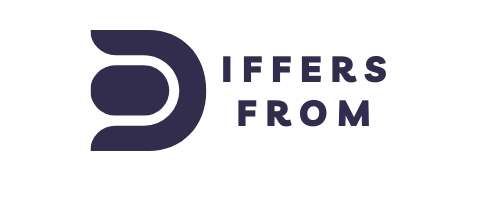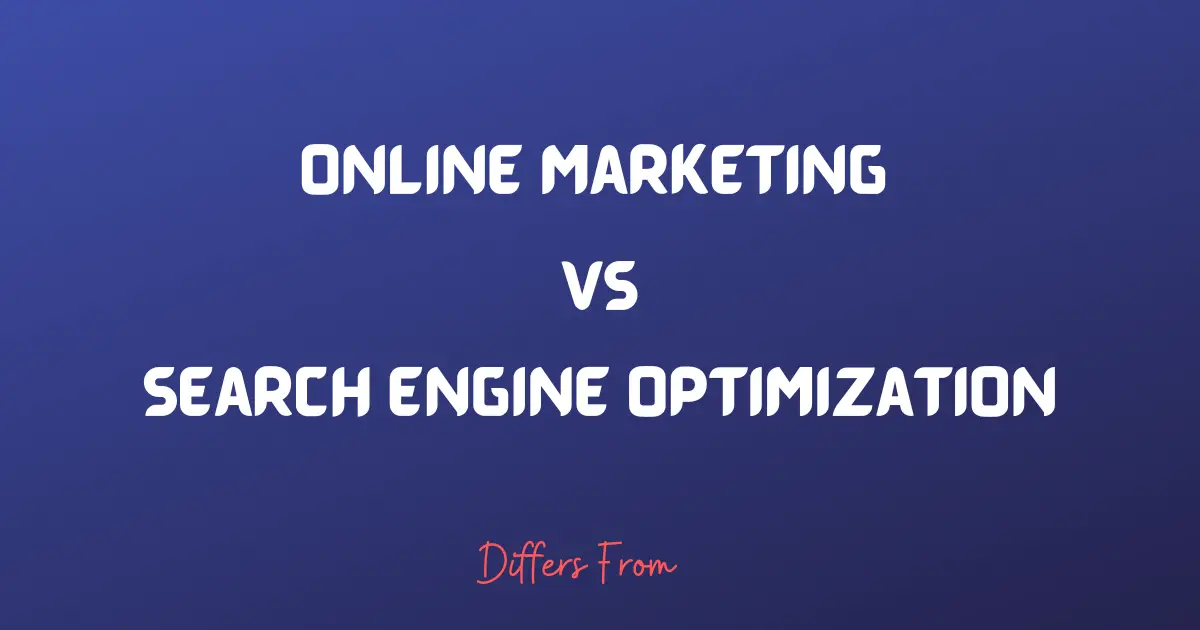In the ever-evolving world of digital outreach, two prominent strategies take the spotlight: online marketing and search engine optimization (SEO).
While both are pivotal for a successful online presence, they operate distinctly. Join us in this concise exploration as we dissect the nuances that separate online marketing from SEO.
Whether you’re a business owner aiming to refine your digital strategy or a curious individual navigating the complexities of the online landscape, this blog aims to provide a quick yet comprehensive overview of the key differences.
Let’s unravel the intricacies together and empower your online journey!”
Difference between online marketing and search engine optimization
| Online Marketing | Search Engine Optimization | |
| Objective | Focuses on promoting products or services through various online channels, including social media, email marketing, and paid advertising. | Aims to improve a website’s visibility on search engines, primarily focusing on organic (non-paid) search results. |
| Paid vs. Organic | Often involves paid advertising and promotions to reach a targeted audience quickly. | Primarily revolves around organic methods to enhance a website’s visibility, emphasizing content quality and relevance. |
| Time Sensitivity | Delivers quick results, making it suitable for time-sensitive campaigns or promotions. | Requires time and patience as it focuses on long-term, sustainable growth in organic search rankings. |
| Channels Utilized | Utilizes a variety of channels such as social media platforms, email newsletters, display ads, and influencer collaborations. | Primarily relies on optimizing website content, meta tags, and building quality backlinks to improve search engine rankings. |
| Cost Structure | Involves budget allocation for paid advertising, with costs varying based on the chosen platform and advertising model (e.g., pay-per-click). | Initial costs may include website optimization, content creation, and link building, with ongoing efforts focusing on organic growth. |
| Measurability | Offers immediate and trackable metrics, allowing businesses to analyze the success of campaigns in real-time. | Metrics, such as improved search rankings and organic traffic, may take time to manifest and require consistent monitoring. |
| Content Emphasis | Prioritizes creating persuasive and engaging content tailored for specific marketing channels and target audiences. | Emphasizes content quality, relevance, and usefulness to cater to both user needs and search engine algorithms. |
| Visibility Factors | Visibility is influenced by the budget allocated, ad quality, and bidding strategy on advertising platforms. | Visibility is earned through the creation of high-quality content, adherence to SEO best practices, and the acquisition of authoritative backlinks. |
| Flexibility | Offers the flexibility to adjust strategies and budgets quickly in response to changing market conditions. | Requires a more steady and consistent approach, with adjustments taking longer to manifest in search rankings. |
| Conversion Focus | Often geared towards immediate conversions and sales, with a direct call-to-action in marketing campaigns. | Focuses on building trust and authority over time, indirectly contributing to conversions through improved organic visibility and credibility. |
What is online marketing?
Online marketing refers to the proactive approach of promoting products or services through various digital channels.
It involves implementing diverse strategies, such as advertising, social media marketing, email campaigns, and content creation, to reach a wider audience.
Online marketing aims to engage potential customers, drive traffic to websites, and ultimately generate sales. By leveraging the power of the internet, businesses can effectively showcase their offerings and connect with their target market in an impactful and measurable way.
What is search engine optimization?
Search engine optimization (SEO) is the strategic process of enhancing a website’s visibility and ranking on search engine result pages.
It involves implementing various techniques and tactics, such as optimizing website structure, improving content quality, and building authoritative backlinks.
By actively optimizing for relevant keywords and user experience, businesses can increase organic traffic, attract targeted visitors, and improve their online presence.
SEO enables websites to earn higher visibility and credibility, ultimately driving sustainable organic growth and improving search engine performance.
Comparison between online marketing and search engine optimization
Online marketing encompasses a broader range of channels and strategies to promote products or services, SEO specifically concentrates on optimizing a website to rank higher in search engine results.
Online marketing may include both organic and paid methods, while SEO mainly focuses on organic search traffic.
However, both online marketing and SEO are complementary and often work together to achieve marketing goals, increase visibility, and drive conversions in the digital landscape.
Online Marketing
Online marketing, also known as internet marketing or digital marketing, refers to a comprehensive set of strategies and tactics used to promote products or services on the internet.
It encompasses a wide range of activities that aim to reach a target audience, create brand awareness, and drive conversions.
Online marketing utilizes various channels and techniques to connect with potential customers, engage them, and influence their purchasing decisions.
Key aspects and channels of online marketing
- Paid Advertising: This involves running paid campaigns such as pay-per-click (PPC) ads, social media ads, display ads, and sponsored content to target specific demographics and increase visibility.
- Social Media Marketing: Leveraging social media platforms like Facebook, Instagram, Twitter, LinkedIn, and YouTube to connect with the audience, build brand presence, share content, and engage users.
- Content Marketing: Creating and distributing valuable and relevant content, such as blog posts, articles, videos, infographics, and eBooks, to attract and engage the target audience, establish thought leadership, and drive organic traffic.
- Email Marketing: Utilizing email campaigns to nurture leads, build relationships with customers, send promotional offers, and encourage repeat business.
- Influencer Marketing: Collaborating with influencers or industry experts to leverage their reach and credibility, promoting products or services through their platforms.
Search Engine Optimization
Search engine optimization (SEO) is a subset of online marketing that focuses specifically on optimizing a website to improve its visibility and ranking on search engine result pages (SERPs).
SEO aims to increase organic (unpaid) traffic by making the website more relevant, authoritative, and user-friendly in the eyes of search engines.
Key aspects of SEO include
- On-Page Optimization: Optimizing website elements such as titles, headings, meta tags, URLs, and content to align with targeted keywords and improve search engine visibility.
- Off-Page Optimization: Building high-quality backlinks from other websites, social media platforms, and directories to enhance the website’s authority and reputation.
- Technical SEO: Optimizing technical aspects of the website, including site structure, mobile-friendliness, page speed, indexing, and crawlability, to ensure search engines can access and understand the site easily.
- Keyword Research: Identifying relevant keywords and phrases that users are searching for in search engines, and strategically incorporating them into website content to improve rankings.
- User Experience (UX): Focusing on improving website navigation, ease of use, readability, and overall user experience to increase engagement and reduce bounce rates.
Conclusion
Online marketing encompasses various strategies for promoting products or services online, while search engine optimization (SEO) focuses specifically on improving a website’s visibility and organic search performance. Both are important for driving online success.
FAQs
What is online marketing?
Online marketing refers to the comprehensive set of strategies and tactics used to promote products or services on the internet through various channels, including paid advertising, social media marketing, content marketing, email campaigns, and more.
What is search engine optimization (SEO)?
Search engine optimization (SEO) is the process of optimizing a website to improve its visibility and ranking on search engine result pages (SERPs) organically.
It involves techniques such as keyword optimization, on-page and off-page optimization, technical improvements, and user experience enhancements.
How do online marketing and SEO differ?
Online marketing encompasses a broader range of strategies to promote products or services on the internet, while SEO specifically focuses on improving a website’s visibility in search engine results through organic methods.
Is paid advertising involved in SEO?
No, SEO primarily focuses on organic search visibility and does not involve paid advertising.
However, businesses may choose to invest in paid advertising as part of their online marketing efforts to complement their SEO strategy.
Can online marketing and SEO work together?
Yes, online marketing and SEO often work together to achieve marketing goals.
Online marketing strategies can incorporate SEO techniques to improve a website’s visibility, attract organic traffic, and enhance the effectiveness of marketing campaigns.

